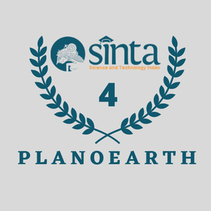Konsep Pemberdayaan Nelayan Pesisir Kota Surabaya Sebagai Bentuk Adaptasi Perubahan Iklim Berbasis Sustainable Livelihood
Abstract
Permasalahan sosial, ekonomi dan ekologi pada kawasan pesisir merupakan permasalahan penting yang terikat satu sama lain. Profil perikanan pada Dinas Pertanian Kota Surabaya menunjukkan bahwa tingkat kesejahteraan nelayan dan akses sumber daya manusia di kawasan pesisir rendah.Selain itu, kondisi pesisir semakin menurun akibat adanya perubahan iklim.Konsep pendekatan mengenai penghidupan yang berkelanjutan (sustainable livelihood) merupakan salah satu bentuk metode yang dapat mengatasi permasalahan di wilayah pesisir. Penelitian ini menggunakan pendekatan deskriptif kualitatif, dengan subjek penelitian masyarakat nelayan pesisir di Kota Surabaya.Variabel yang digunakan adalah modal sosial, modal alam, modal fisik, modal manusia dan modal finansial. Hasil penelitian menunjukkan bahwa faktor modal manusia memiliki peranan paling penting dalam rangka meningkatkan kesejahteraan masyarakat nelayan. Sehingga diperlukan konsep dan langkah pemberdayaan sesuai dengan masing-masing variabel terkait penghidupan berkelanjutan (sustainable livelihood).
Abstract: Social, economic, and ecological problems in coastal areas are important issues that are bound to one another. The Fisheries profile at Dinas Pertanian Kota Surabaya shows that the level of fishermen's welfare and access to human resources in the coastal area are low. Besides, coastal conditions are declining due to climate change. The concept of an approach to sustainable livelihood is one method that can overcome problems in coastal areas. This study uses a qualitative descriptive approach with coastal fishing communities in Surabaya City as research subjects. The variables used are social capital, natural capital, physical capital, human capital, and financial capital. The results show that the human capital factor has the most important role to improve the welfare of the fishing community. Therefore, the empowerment concepts and steps are needed in accordance with each variable related to a sustainable livelihood.Keywords
Full Text:
PDFReferences
Gai, Ardiyanto M., I. Soewarni and M.M. Sir., The Concept of Community Poverty Reduction in Coastal Area of Surabaya Based on Sustainable Livelihood Approach,IOP Conference Series: Earth and Environmental Science, 2017.
Purnomo, Heri A., S. H. Suryawati, I. M. Radjawane dan K. O. Sembiring, Perubahan Ikim di Wilayah Pesisir : Konsepsi dan Aplikasi Strategi Adaptasi, Penerbit ITB, 2015.
Kamaruddin, Roslina, The Sustainable Livelihoods Index: A Tool To Assess The Ability AndPreparedness Of The Rural Poor In Receiving Entrepreneurial Project,Journal of Social Economics Research, 2014.
Saragih, Sebastian, Lassa Jonatan dan Ramli Afan, Kerangka Penghidupan Berkelanjutan(Sustainable Livelihood Framework), 2007.
Badan Perencanaan dan Pembangunan Kota (BAPPEKO) Surabaya, Rencana Strategis Wilayah Pesisir Kota Surabaya. 2011.
Suharto,Edi, Modal Sosial dan Kebijakan Publik, 2007.
DFID, Sustainable Livelihood Guidance Sheets, Department for International Development, www.livelihoods.org/info/info_guidancesheets.html, 2000
Kodoatie, Robert J., Pengantar Manajemen Infrastruktur, Pustaka Pelajar, Yogyakarta, 2005.
Fattah, Nanang, Landasan Manajemen Pendidikan, Remaja Rosdakarya, Bandung, 2004.
Ekowati, S., O. Rusmana dan M. Mafudi, Akuntansi, Organisasi dan Masyarakat : Pengaruh Modal Fisik, Modal Finansial dan Modal Intelektual Terhadap Kinerja Perusahaan Manufaktur di Bursa Efek Indonesia, 2012.
DOI: https://doi.org/10.31764/jpe.v5i1.2153
Refbacks
- There are currently no refbacks.
Copyright (c) 2020 Jurnal Planoearth

This work is licensed under a Creative Commons Attribution-ShareAlike 4.0 International License.
_________________________________________________________
Jurnal Planoearth
ISSN
2502-5031
(Print) |
2615-4226
(Online)
Email: [email protected]
Contact (WA): +62 813-2837-4359

This work is licensed under a
Creative Commons Attribution-ShareAlike 4.0 International License
.
Jurnal Planoearth telah terindeks di:
















